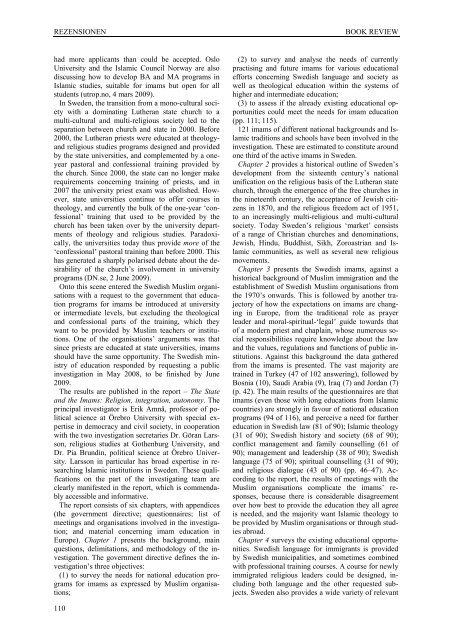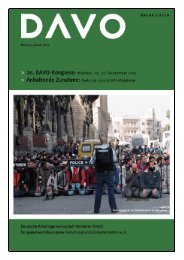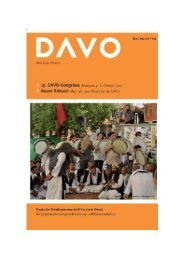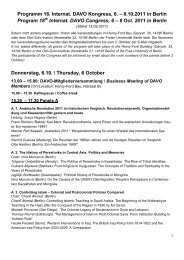4 Dissertationen und Habilita- tionen / Dissertations and Ha- bilitations
4 Dissertationen und Habilita- tionen / Dissertations and Ha- bilitations
4 Dissertationen und Habilita- tionen / Dissertations and Ha- bilitations
Sie wollen auch ein ePaper? Erhöhen Sie die Reichweite Ihrer Titel.
YUMPU macht aus Druck-PDFs automatisch weboptimierte ePaper, die Google liebt.
REZENSIONEN BOOK REVIEW<br />
had more applicants than could be accepted. Oslo<br />
University <strong>and</strong> the Islamic Council Norway are also<br />
discussing how to develop BA <strong>and</strong> MA programs in<br />
Islamic studies, suitable for imams but open for all<br />
students (utrop.no, 4 mars 2009).<br />
In Sweden, the transition from a mono-cultural society<br />
with a dominating Lutheran state church to a<br />
multi-cultural <strong>and</strong> multi-religious society led to the<br />
separation between church <strong>and</strong> state in 2000. Before<br />
2000, the Lutheran priests were educated at theology-<br />
<strong>and</strong> religious studies programs designed <strong>and</strong> provided<br />
by the state universities, <strong>and</strong> complemented by a oneyear<br />
pastoral <strong>and</strong> confessional training provided by<br />
the church. Since 2000, the state can no longer make<br />
requirements concerning training of priests, <strong>and</strong> in<br />
2007 the university priest exam was abolished. However,<br />
state universities continue to offer courses in<br />
theology, <strong>and</strong> currently the bulk of the one-year ‘confessional’<br />
training that used to be provided by the<br />
church has been taken over by the university departments<br />
of theology <strong>and</strong> religious studies. Paradoxically,<br />
the universities today thus provide more of the<br />
‘confessional’ pastoral training than before 2000. This<br />
has generated a sharply polarised debate about the desirability<br />
of the church’s involvement in university<br />
programs (DN.se, 2 June 2009).<br />
Onto this scene entered the Swedish Muslim organisations<br />
with a request to the government that education<br />
programs for imams be introduced at university<br />
or intermediate levels, but excluding the theological<br />
<strong>and</strong> confessional parts of the training, which they<br />
want to be provided by Muslim teachers or institutions.<br />
One of the organisations’ arguments was that<br />
since priests are educated at state universities, imams<br />
should have the same opportunity. The Swedish ministry<br />
of education responded by requesting a public<br />
investigation in May 2008, to be finished by June<br />
2009.<br />
The results are published in the report – The State<br />
<strong>and</strong> the Imams: Religion, integration, autonomy. The<br />
principal investigator is Erik Amnå, professor of political<br />
science at Örebro University with special expertise<br />
in democracy <strong>and</strong> civil society, in cooperation<br />
with the two investigation secretaries Dr. Göran Larsson,<br />
religious studies at Gothenburg University, <strong>and</strong><br />
Dr. Pia Br<strong>und</strong>in, political science at Örebro University.<br />
Larsson in particular has broad expertise in researching<br />
Islamic institutions in Sweden. These qualifications<br />
on the part of the investigating team are<br />
clearly manifested in the report, which is commendably<br />
accessible <strong>and</strong> informative.<br />
The report consists of six chapters, with appendices<br />
(the government directive; questionnaires; list of<br />
meetings <strong>and</strong> organisations involved in the investigation;<br />
<strong>and</strong> material concerning imam education in<br />
Europe). Chapter 1 presents the backgro<strong>und</strong>, main<br />
questions, delimitations, <strong>and</strong> methodology of the investigation.<br />
The government directive defines the investigation’s<br />
three objectives:<br />
(1) to survey the needs for national education programs<br />
for imams as expressed by Muslim organisations;<br />
110<br />
(2) to survey <strong>and</strong> analyse the needs of currently<br />
practising <strong>and</strong> future imams for various educational<br />
efforts concerning Swedish language <strong>and</strong> society as<br />
well as theological education within the systems of<br />
higher <strong>and</strong> intermediate education;<br />
(3) to assess if the already existing educational opportunities<br />
could meet the needs for imam education<br />
(pp. 111; 115).<br />
121 imams of different national backgro<strong>und</strong>s <strong>and</strong> Islamic<br />
traditions <strong>and</strong> schools have been involved in the<br />
investigation. These are estimated to constitute aro<strong>und</strong><br />
one third of the active imams in Sweden.<br />
Chapter 2 provides a historical outline of Sweden’s<br />
development from the sixteenth century’s national<br />
unification on the religious basis of the Lutheran state<br />
church, through the emergence of the free churches in<br />
the nineteenth century, the acceptance of Jewish citizens<br />
in 1870, <strong>and</strong> the religious freedom act of 1951,<br />
to an increasingly multi-religious <strong>and</strong> multi-cultural<br />
society. Today Sweden’s religious ‘market’ consists<br />
of a range of Christian churches <strong>and</strong> denominations,<br />
Jewish, Hindu, Buddhist, Sikh, Zoroastrian <strong>and</strong> Islamic<br />
communities, as well as several new religious<br />
movements.<br />
Chapter 3 presents the Swedish imams, against a<br />
historical backgro<strong>und</strong> of Muslim immigration <strong>and</strong> the<br />
establishment of Swedish Muslim organisations from<br />
the 1970’s onwards. This is followed by another trajectory<br />
of how the expectations on imams are changing<br />
in Europe, from the traditional role as prayer<br />
leader <strong>and</strong> moral-spiritual-‘legal’ guide towards that<br />
of a modern priest <strong>and</strong> chaplain, whose numerous social<br />
responsibilities require knowledge about the law<br />
<strong>and</strong> the values, regulations <strong>and</strong> functions of public institutions.<br />
Against this backgro<strong>und</strong> the data gathered<br />
from the imams is presented. The vast majority are<br />
trained in Turkey (47 of 102 answering), followed by<br />
Bosnia (10), Saudi Arabia (9), Iraq (7) <strong>and</strong> Jordan (7)<br />
(p. 42). The main results of the questionnaires are that<br />
imams (even those with long educations from Islamic<br />
countries) are strongly in favour of national education<br />
programs (94 of 116), <strong>and</strong> perceive a need for further<br />
education in Swedish law (81 of 90); Islamic theology<br />
(31 of 90); Swedish history <strong>and</strong> society (68 of 90);<br />
conflict management <strong>and</strong> family counselling (61 of<br />
90); management <strong>and</strong> leadership (38 of 90); Swedish<br />
language (75 of 90); spiritual counselling (31 of 90);<br />
<strong>and</strong> religious dialogue (43 of 90) (pp. 46–47). According<br />
to the report, the results of meetings with the<br />
Muslim organisations complicate the imams’ responses,<br />
because there is considerable disagreement<br />
over how best to provide the education they all agree<br />
is needed, <strong>and</strong> the majority want Islamic theology to<br />
be provided by Muslim organisations or through studies<br />
abroad.<br />
Chapter 4 surveys the existing educational opportunities.<br />
Swedish language for immigrants is provided<br />
by Swedish municipalities, <strong>and</strong> sometimes combined<br />
with professional training courses. A course for newly<br />
immigrated religious leaders could be designed, including<br />
both language <strong>and</strong> the other requested subjects.<br />
Sweden also provides a wide variety of relevant





